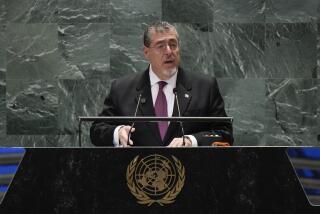Gaza Gets Police Force of Militants
- Share via
GAZA CITY — In a sharp challenge to Palestinian Authority President Mahmoud Abbas, the Hamas-led government Wednesday deployed a newly created police force made up mainly of members of Palestinian militant groups.
Clutching Kalashnikov assault rifles, the gunmen fanned out across the Gaza Strip, moving in twos and threes along city streets and in refugee camp alleyways. On a grassy traffic median, small groups of them shouldered their weapons and spread prayer rugs when the afternoon call to prayer rang out across the car-choked streets.
Abbas vetoed the creation of the 3,000-member force last month when it was announced by Interior Minister Said Siyam, a Hamas loyalist.
Hamas ignored the presidential decree, although it stayed quiet about the role of a well-known Palestinian militant, Jamal abu Samhadana, who had been named as the new force’s commander.
The deployment, which was moved up by 10 days, came against a backdrop of growing strife in Gaza between rival gunmen from Hamas and Abbas’ Fatah faction. In a span of less than 24 hours Tuesday and Wednesday, two members of Hamas’ military wing were killed in separate ambush-style shootings, and two other Hamas men were wounded in a third attack.
At a news conference, Siyam cited a wave of abductions and shootings as a sign of the lawlessness he said the new force was set up to combat.
“We cannot ignore the fact that the security apparatus is weak -- there are too many crimes and killings,” he said.
Allies of the moderate Abbas, who was traveling outside the Palestinian territories, swiftly denounced the Hamas move.
“The illegality of this force has already been declared, and it should be dismantled immediately,” said Nabil abu Rudaineh, a senior aide to the president.
Control of the Palestinian security forces, thought to number about 80,000 men, has been a key issue in the ongoing power struggle between Abbas and the Hamas movement, which swept to victory in parliamentary elections in January.
The Islamic militant group has abandoned its campaign of suicide bombings in Israel. But it has refused to recognize the Jewish state’s right to exist or to renounce violence, and as a result direct international aid to the Palestinian Authority has largely dried up.
Under Palestinian law, the executive branch, once headed by Yasser Arafat, has direct control over about half of the security forces. After Hamas’ election victory, Abbas had consolidated the remainder under the command of a political ally, Rashid abu Shbak.
At his news conference, Siyam complained that his rights as interior minister had been usurped. “When I give clear and strong orders, many times they are not implemented,” he said.
The new force, Siyam said, would report directly to him. No mention was made of Abu Samhadana, whose appointment as the force’s commander had drawn heated protests from Israel and the United States. Abu Samhadana was implicated in a 2003 attack on an American convoy in Gaza that killed three U.S. security guards.
Siyam said the unit consisted of members of groups from across the political spectrum, and not only from Islamist parties such as Hamas. But the armed men seen on the streets, wearing black T-shirts and camouflage trousers, nearly all had the beards favored by observant Muslims. Some wore green Hamas headbands.
Until now, the security forces have been dominated by the largely secular-minded Fatah.
The bitterness between the two factions was on clear display at the funeral of Hamas field commander Mahmoud Tata, who was killed late Tuesday night in a drive-by shooting only yards away from the Gaza residence of Abbas.
Angry mourners flocked to Gaza’s main hospital to collect his corpse from the morgue for burial. Small boys wailed and pounded on the building’s metal shutters as the body, wrapped in a white shroud and a green Hamas flag, was brought out and loaded onto an open truck.
“We know the Preventive Security was responsible for this,” said Nasser Tata, a cousin of the dead man, referring to the most powerful and feared of the Palestinian security forces.
“God will punish them,” he said. “And so will the Palestinian people.”
In the mourners’ procession, some masked fighters carried loaded missile launchers and brandished grenades.
Family members said they would eschew the traditional mourning tent, set up as a gathering place for friends and kin, until the killers were caught and punished.
With the mood in Gaza growing more volatile in the two months that tens of thousands of civil servants have gone unpaid, Israel on Wednesday reopened the main cargo crossing between Gaza and Israel. The crossing, which is crucial to Gaza’s economy, has been closed almost continuously since the start of the year for what Israel has described as security reasons.
Many Gazans say the infighting between Hamas and Fatah has left them feeling fearful even in the midst of mundane activities such as work and school.
On Tuesday, about two dozen gunmen stormed the Gaza City headquarters of the Palestinian mobile telephone company Jawwal. After complaining that their cellphone service had been cut off when they failed to pay their bills, the gunmen fired off a volley of shots, damaging some equipment and terrifying workers but causing no injuries.
On Wednesday, blue-uniformed Jawwal employees marched through Gaza City in protest, carrying signs saying: “No to chaos -- yes to the rule of law.”
Sabri Mehdani was among the demonstrators.
“What kind of a way is that to resolve a dispute over a phone bill, firing guns inside an office building?” he said incredulously. “We demand safety -- that is our message to the government.”
More to Read
Sign up for Essential California
The most important California stories and recommendations in your inbox every morning.
You may occasionally receive promotional content from the Los Angeles Times.










